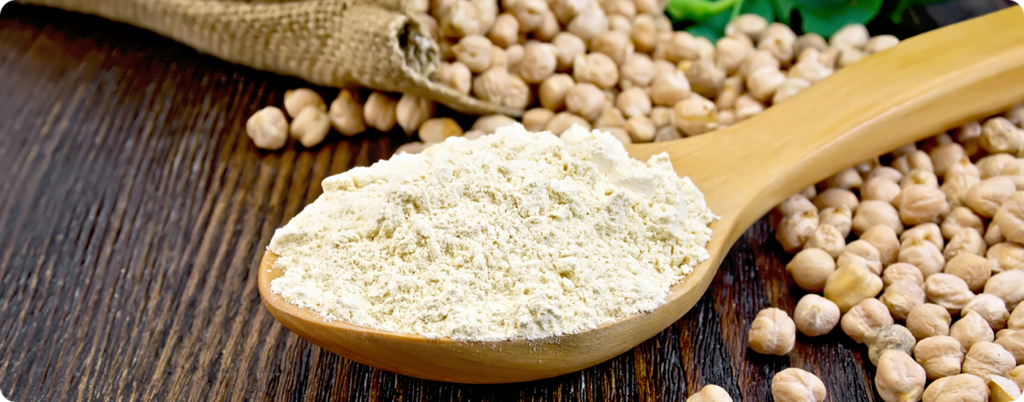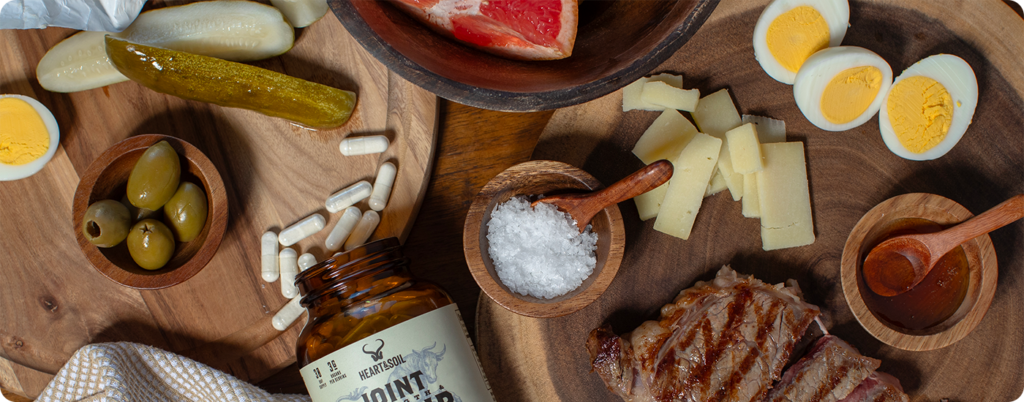PLEASE NOTE: The information in this blog is for educational purposes only. It is not a substitute for professional medical advice. Consult your healthcare provider if you’re seeking medical advice, diagnoses, or treatment.
One of the ways that people boost their protein intake is through protein powders. These supplements are promoted heavily to athletes and anyone looking to gulp down a “healthy” meal on the go.
Protein powders are used to build muscle, lose weight, or improve athletic performance and recovery. The protein powder market exceeded $22 billion in 2022 (1).
We understand that living a busy life makes it hard to prepare and eat meals using whole food, so the convenience of shaking up a few scoops of protein powder is ultra-appealing, especially if the product promises to accelerate your performance, muscle gain, or weight loss.
The problem is that protein powders come with hidden downsides!
In this article, we’ll explore common issues with protein powders, the importance of protein, and alternatives to protein powders.
Hint: You may not be going back to GNC for a protein powder anytime soon!
The Importance of Protein Intake
Adequate protein is crucial for a variety of reasons. Protein is used for muscle building, repair, and hormone synthesis.
Proper protein intake also helps encourage healthy weight loss and promote general well-being (2).
How much protein do you really need? It depends!
Paul Saladino, MD, explains his daily protein suggestions in this video.
You can also find a calculator tool on his website that helps you determine your ideal macronutrient (protein, fat, and carbs) intake based on your goal body weight and activity level.
It’s important to note that the efficacy of protein supplementation depends on your activity level, diet, and metabolic health (3).
Regarding diet, total daily protein and energy intake (over the long term) are crucial if you want to see results from exercise.

Ineffective resistance training programs render protein supplements less impactful (4).
So, the importance of protein cannot be overlooked. However, not all protein sources are equal, and other diet and lifestyle habits (sleep, stress levels, etc.) must be considered to see the best results.
6 Common Issues With Protein Powders
Protein powders can be helpful for some lifestyles, but there are a few important issues to be aware of.
1. Most protein powders contain harmful added ingredients.
Protein powders are made from a vast range of ingredients, including soybeans, rice, peas, hemp, whey, eggs, and even crickets.
The final product is usually combined with synthetic vitamins, minerals, creatine, or caffeine. They may also include artificial sweeteners, seed oils, and emulsifiers like xanthan gum.
To some degree, the popularity of these powders is driven by a desire to repurpose waste products from other industries.
Soy protein isolate is a heavily processed waste stream from the soybean oil industry. Whey protein is a byproduct of cheese production (5).
2. Protein powders may lead to unpleasant symptoms.
Protein powders are commonly associated with unpleasant gut symptoms like nausea, decreased appetite, diarrhea, constipation, and stomach pain (6).
A systematic review even showed that chronic and excessive use of protein supplementation may lead to adverse events for the liver and kidneys.
The Girl Scout Thin Mint flavored protein powder may not be doing your body any favors!
3. Protein powders are HIGHLY processed.
Most protein powders undergo intense processing to make them palatable for human consumption.
This level of processing can remove the naturally occurring fat, carbohydrates, vitamins, and minerals (7).
An article from the Weston A. Price Foundation outlines the myriad problems with how most protein powders are produced.
Pressure and intense heat can destroy the natural properties of the protein and growth factors. These high-tech processes often take place in chemical factories, not kitchens.
4. Contamination from heavy metals and BPA.
One of the hidden problems with protein powder is contamination with heavy metals and an endocrine disruptor known as BPA (bisphenol A).
In 2018, the Clean Label Project analyzed 134 top-selling protein powders and found alarming contamination levels in most products (8).
53 of the top-selling products had elevated lead, mercury, cadmium, arsenic, and BPA levels.

Plant-based protein powders contained the highest levels of heavy metals.
Surprisingly, certified organic protein powders showed twice the levels of heavy metals as non-organic options.
Plants acquire heavy metals through the air, water, and soil that may remain after processing (9). Contaminated milk may also contribute to the presence of heavy metals in whey protein.
While animal-based proteins, particularly eggs, tested the cleanest from heavy metals, the presence of BPA is another critical factor. It is most likely connected to the product packaging.
BPA is associated with several severe conditions, including Polycystic Ovary Syndrome (PCOS) and cancerous breast and prostate tumors (10).
Be sure to request purity and safety testing from a company before purchasing a protein powder. Look elsewhere if they don’t have any or refuse to share it.
5. Protein powders are poorly regulated.
Protein powders are classified as a dietary supplement in the United States. This means the FDA does not test for safety and purity (11).
Baby formula is closely monitored for BPA and heavy metals. Still, this regulation does not apply to protein powders and meal replacement powders for adults.
6. Amino acid imbalance.
It’s common to mainly include protein sources like lean ground beef or skinless chicken breast. Our ancestors included not only muscle meats but the skin, bones, and other organs.
Connective tissue contains glycine, which helps balance the methionine found in muscle meats.
Check out this article for more details, but in short, methionine and glycine are amino acids that impact your health.
Glycine plays a crucial role in sleep and bone and skin health. Too much methionine can deplete your glycine levels.
Muscle meat, eggs, and dairy are abundant sources of methionine. Bones, bone broth, collagen, and gelatin are rich yet often overlooked sources of glycine.
So, some people may do better with glycine-rich foods or collagen and gelatin powders (Great Lakes and Perfect Supplements are popular brands).
Additionally, Joint Strength & Repair and Skin, Hair & Nails both contain glycine.
Not everyone is ready to jump fully into the animal-based lifestyle. Still, Heart & Soil supplements make getting the nutrients your body needs easy.
Your Protein Should Primarily Come From Whole Foods
We believe most people can fully fuel their bodies with protein and nutrients without using a protein powder. This applies to serious athletes with demanding routines, and anyone focused on optimal physical performance.
If you’re looking to bulk up or achieve a high level of physical fitness, eating an animal-based diet is a great strategy.

In summary, an animal-based diet is built on a few pillars:
- Eliminating seed oils.
- Eat a grass-fed, grass-finished, nose-to-tail diet.
- Prioritizing low-toxicity foods like organic fruit, raw honey, and raw dairy.
Simply put, these are the most nourishing foods on the planet. You can get nearly every vitamin and mineral you need.
Organs, in particular, contain growth factors and peptides that act as signaling molecules and support crucial systems throughout your body.
When you’re using whole foods to supply your body with the macro and micronutrients it needs, you may not even need a protein supplement.
If you’re accustomed to the convenience of protein powders, the transition away from them may feel challenging.
If you depend on protein powder to keep your life running smoothly, consider purchasing from Mt. Capra. Their goat milk-based powders are free of flavors, colors, and chemicals and are produced using gentle dehydration techniques.
You can also find other options from the Clean Label Project that will be free from contaminants and align well with the animal-based diet.
What About Creatine?
Last but not least, creatine is a wonder nutrient supporting your metabolic health, cognitive function, and body composition.
But, additional creatine supplementation may only be necessary for some people.
A well-constructed animal-based diet can provide enough creatine to support your performance goals.
Depending on your size, you want to consume around 3-5g of creatine daily.
The level of creatine in grass-fed beef is approximately 2.5g of creatine for every 1.1 lbs of meat or 5g for every 2.2 lbs of beef (12).
The Bottom Line About Protein Powders
Protein powders should not be considered a replacement for whole foods protein sources such as red meat, dairy, eggs, or other animal products.
There are numerous issues with protein powders, such as harmful added ingredients and contamination with heavy metals.
They also undergo intense processing and are largely unregulated. Consumption of these products can lead to uncomfortable gut symptoms.
Those needing a protein powder (like high-level athletes) should look for high-quality options with clean ingredients tested for contaminants.
Adequate protein intake is essential, but not all sources are equal! Natural foods are better than a product made in a high-tech factory.
Subscribe to future articles like this: